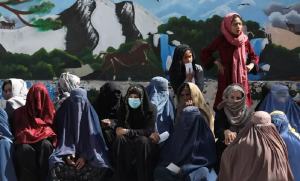It’s not rare for a person to express bizarrely opposite opinions about one issue on different occasions. However, it’s a sad thing for a politician.

U.S. Ambassador to Japan Rahm Emanuel’s recent remarks on China perfectly demonstrate the art of self-contradiction by a seasoned politician.
Ambassador Emanuel recently joined the chorus of overcapacity rhetoric on China’s economy, claiming “China is taking its domestic economic problems and exporting them to the rest of the world.” He went even further: “China is not going to win the good neighbor award,” referring to “either economic or strategic challenges that China caused with its neighbors.”
Emanuel’s words aroused pity and sadness. For those who are knowledgeable about the development of China-U.S. relations, they would recall that before Emanuel assumed the role of the U.S. Ambassador to Japan, he served as mayor of Chicago for many years and was an ardent advocate of trade with China.
He frequently flew back and forth across the Pacific to woo Chinese investors. Chinese railcars manufacturer CRRC Sifang America won a 1.3-billion-U.S.-dollar contract in 2016 to supply 846 railcars to Chicago’s railway system. These would replace nearly half of the agency’s fleet, where the oldest cars had hit the tracks for more than 30 years. Afterward, a trade war initiated by the Trump administration cast a cloud over China-U.S. relations. At this urgent moment, Mayor Emanuel flew to China to allay concerns. “This project and the hundreds of jobs it will create should not fall victim to the Trump trade war,” Mayor Emanuel said in July 2018.
Once a zealous recipient of Chinese products, Emanuel is now accusing China of exporting its domestic problems to the rest of the world. Were those reliable and affordable Chinese railcars also “China’s domestic problems” when he was mayor? If so, why did he welcome the arrival of those “domestic problems”?
From Mayor Emanuel to Ambassador Emanuel, his “change of heart” is transformational.
It seems that Ambassador Emanuel’s rhetoric intended to drive a wedge between China and its neighbors. By apparently turning a blind eye to China’s goodwill towards shared development with its neighbors, the ambassador is not contributing to a harmonious and healthy environment. Instead, he is distorting facts and misrepresenting the truth.
For example, the railway linking China and its neighbor, Laos, began operations in December 2021, giving a boost to Laos’ goal of converting itself from a landlocked country to a land-linked hub.
With the implementation of the Regional Comprehensive Economic Partnership and the construction of the China-ASEAN Free Trade Area, bilateral trade between China and ASEAN countries (mainly China’s neighbouring countries) continued to grow in 2023, reaching 6.41 trillion yuan (about 886 billion U.S. dollars). ASEAN has maintained its position as China’s largest trading partner for four consecutive years, while China has also remained ASEAN’s largest trading partner for 14 years in a row.
In a U.S. election year, China bashing has again become an easy way to gain political support, regardless of the truth and the common good of the two peoples. The mongers of so-called “China threat” begin to bury their heads in the sand and speak against common sense. This is a fact that can’t be denied and demands vigilant attention.

